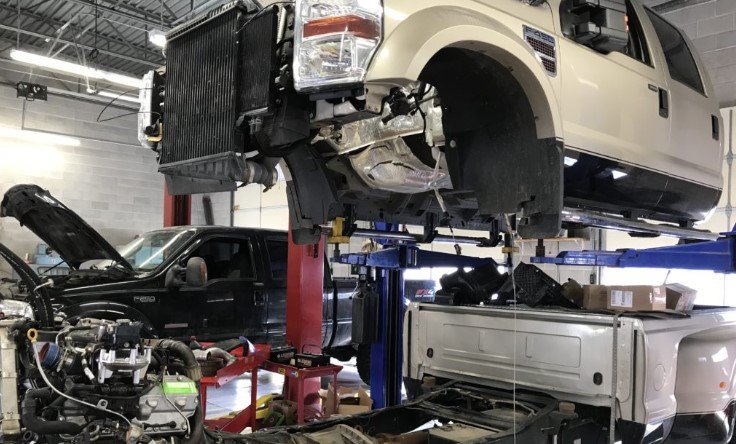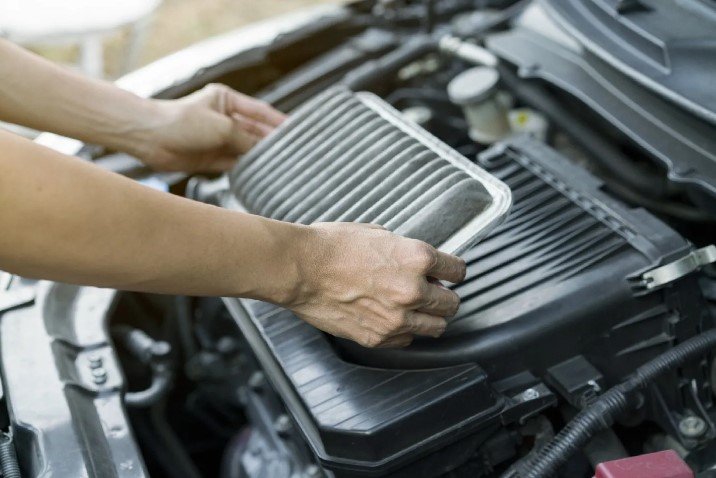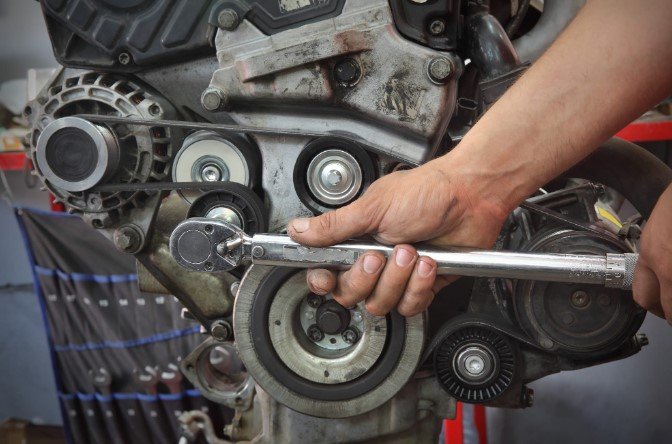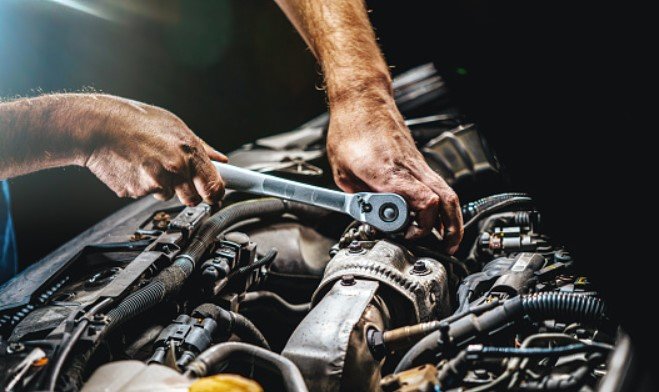
Powerstroke Diesel Mechanic: Mastering the Heart of Heavy Duty Engines

Diesel engines power a wide array of vehicles and equipment, from trucks to heavy machinery. Among these, Powerstroke diesel engines stand out for their robustness and reliability. However, like any mechanical system, they require proper care and maintenance to ensure optimal performance and longevity.
Introduction to Powerstroke Diesel Mechanic
What is a Powerstroke Diesel Engine?
A Powerstroke diesel engine is a type of diesel engine developed by Ford Motor Company. Renowned for their durability and towing capabilities, these engines are commonly found in Ford trucks such as the F-Series Super Duty lineup. They are designed to provide maximum power and efficiency for demanding tasks.
Importance of Proper Maintenance
Maintaining a Powerstroke diesel engine is crucial for several reasons. Regular servicing helps prevent costly breakdowns, ensures fuel efficiency, and prolongs the engine’s lifespan. A skilled Powerstroke diesel mechanic plays a vital role in keeping these engines running smoothly.
Skills and Training Required
Becoming a proficient Powerstroke diesel mechanic requires a combination of technical knowledge and practical skills.
Technical Knowledge
Mechanics must understand the inner workings of diesel engines, including fuel injection systems, turbochargers, and electrical components. They should be familiar with diagnostic procedures and repair techniques specific to Powerstroke engines.
Certification and Training Programs
Many vocational schools and technical institutes offer specialized training programs for diesel mechanics. Certification through organizations like the National Institute for Automotive Service Excellence (ASE) demonstrates competency and expertise in the field.
Common Issues with Powerstroke Engines
Despite their reputation for durability, Powerstroke engines are susceptible to certain issues.
Faulty Injectors
Injector problems can lead to rough idling, reduced power, and increased emissions. Replacing worn or malfunctioning injectors is a common repair task for diesel mechanics.
Turbocharger Issues
Turbocharger failures can result in loss of power and excessive exhaust smoke. Mechanics must diagnose turbocharger problems accurately and perform repairs or replacements as needed.
Electrical Problems
Electrical issues such as wiring harness faults or sensor failures can cause various performance issues. Troubleshooting electrical systems requires specialized knowledge and diagnostic tools.
Tools of the Trade
Powerstroke diesel mechanics rely on a range of tools and equipment to diagnose and repair engine problems.
Diagnostic Equipment
Modern diesel engines feature sophisticated onboard diagnostic systems that communicate with diagnostic scanners. Mechanics use these tools to retrieve fault codes and perform system tests.
Specialty Tools
Certain tasks, such as injector removal and turbocharger servicing, require specialized tools designed specifically for Powerstroke engines. Investing in high-quality tools ensures efficient and accurate repairs.
Routine Maintenance Procedures
Regular maintenance is essential for keeping Powerstroke engines in top condition.
Oil Changes
Frequent oil changes are vital for preventing engine wear and maintaining proper lubrication. Mechanics must use the correct type and grade of oil recommended by the manufacturer.
Fuel Filter Replacement
Clean fuel is critical for diesel engine performance. Mechanics replace fuel filters at regular intervals to prevent contaminants from reaching the injectors.
Air Filter Inspection
A clean air filter is essential for optimal engine combustion and performance. Mechanics inspect air filters regularly and replace them when dirty or clogged.
Troubleshooting Techniques
When diagnosing engine problems, Powerstroke diesel mechanics employ various techniques to identify issues accurately.
Using Diagnostic Codes
Diagnostic trouble codes (DTCs) provide valuable information about engine malfunctions. Mechanics use code readers or scan tools to retrieve and interpret DTCs.
Visual Inspections
Inspecting components visually can reveal signs of wear, damage, or fluid leaks. Mechanics carefully examine engine components during routine maintenance inspections.
Repair Procedures
Repairing Powerstroke engines requires precision and expertise.
Injector Replacement
Replacing faulty injectors involves removing the fuel rail, disconnecting electrical connectors, and carefully installing new injectors. Mechanics must ensure proper seating and sealing to prevent fuel leaks.
Turbocharger Rebuilds
Rebuilding a turbocharger entails disassembling the unit, inspecting components for wear or damage, and replacing worn parts as necessary. Mechanics must follow manufacturer guidelines for proper assembly and balancing.
Electrical Repairs
Diagnosing and repairing electrical issues may involve testing sensors, inspecting wiring harnesses, and replacing faulty components. Mechanics use wiring diagrams and multimeters to troubleshoot electrical circuits.
Preventive Measures
Taking proactive steps to prevent problems is key to maintaining Powerstroke engines.
Regular Inspections
Performing routine inspections allows mechanics to identify potential issues before they escalate into major problems. Inspecting belts, hoses, and fluid levels helps prevent unexpected breakdowns.
Addressing Issues Promptly
Promptly addressing engine problems prevents further damage and minimizes downtime. Mechanics prioritize repairs based on severity and impact on engine performance.
Benefits of Hiring a Professional Mechanic
While DIY repairs may seem tempting, hiring a professional Powerstroke diesel mechanic offers several advantages.
Expertise and Experience
Experienced mechanics have in-depth knowledge of Powerstroke engines and can diagnose and repair problems efficiently. They stay updated on the latest technologies and repair techniques.
Warranty Protection
Having repairs performed by a qualified mechanic ensures that warranty coverage remains intact. Manufacturers may void warranties if unauthorized repairs are attempted.
Cost Considerations
While professional repairs may seem costly, they offer long-term value and peace of mind.
Price of Parts and Labor
Quality replacement parts and skilled labor contribute to the cost of professional repairs. However, using genuine OEM parts ensures compatibility and reliability.
Value of Professional Service
Professional mechanics offer quality service backed by industry expertise and experience. Their thorough diagnostics and precise repairs minimize the risk of future issues.
Customer Satisfaction
Reliable repairs are essential for customer satisfaction and loyalty.
Importance of Reliable Repairs
Customers rely on their vehicles for work, transportation, and recreation. Quality repairs performed by skilled mechanics ensure that vehicles operate safely and reliably.
Building Trust and Loyalty
Providing excellent service fosters trust and loyalty among customers. Satisfied clients are more likely to return for future maintenance and recommend the mechanic to others.
Career Opportunities
The demand for skilled Powerstroke diesel mechanics continues to grow.
Demand for Skilled Technicians
As diesel technology advances, the need for qualified mechanics will increase. Job opportunities exist in dealerships, repair shops, fleet maintenance facilities, and other settings.
Advancement Possibilities
Experienced mechanics may advance to supervisory or management roles. Specializing in specific areas such as diagnostics or performance tuning can lead to higher-paying positions.
Challenges in the Field
Powerstroke diesel mechanics face various challenges in their profession.
Keeping Up with Technology
Advancements in diesel engine technology require mechanics to stay updated on new diagnostic tools and repair techniques. Continuing education and training are essential for staying competitive in the field.
Handling Complex Repairs
Some engine repairs, such as internal component replacements, require advanced skills and specialized equipment. Mechanics must be prepared to tackle complex tasks efficiently.
Future Outlook
The future looks promising for Powerstroke diesel mechanics.
Trends in Diesel Technology
Advancements in fuel efficiency, emissions control, and engine performance drive innovation in diesel technology. Mechanics who stay abreast of these developments will remain in demand.
Opportunities for Specialization
Specializing in specific areas such as hybrid diesel-electric systems or alternative fuels can open up new career opportunities. Mechanics who embrace emerging technologies will thrive in the evolving automotive industry.
Conclusion
Powerstroke diesel mechanics play a vital role in keeping heavy-duty engines running smoothly. Their expertise, training, and dedication ensure that vehicles operate reliably and efficiently. As diesel technology continues to evolve, skilled mechanics will remain in high demand, shaping the future of transportation and industry.
FAQs
- How often should I have my Powerstroke diesel engine serviced?
- It’s recommended to follow the manufacturer’s service intervals, typically every 5,000 to 10,000 miles, or as outlined in the owner’s manual.
- What are the signs of a failing turbocharger in a Powerstroke engine?
- Symptoms may include loss of power, excessive exhaust smoke, and unusual noises from the turbocharger.
- Can I perform basic maintenance tasks on my Powerstroke engine myself?
- While some tasks like oil changes and filter replacements can be DIY-friendly, complex repairs and diagnostics are best left to trained professionals.
- How can I find a reliable Powerstroke diesel mechanic in my area?
- Look for mechanics with specialized training and certification in diesel engine repair. Online reviews and recommendations from friends or colleagues can also be helpful.
- Are there any aftermarket performance upgrades available for Powerstroke engines?
- Yes, there are various aftermarket upgrades available, such as performance tuners, exhaust systems, and air intake kits. However, it’s essential to research and choose reputable brands to ensure compatibility and reliability.



